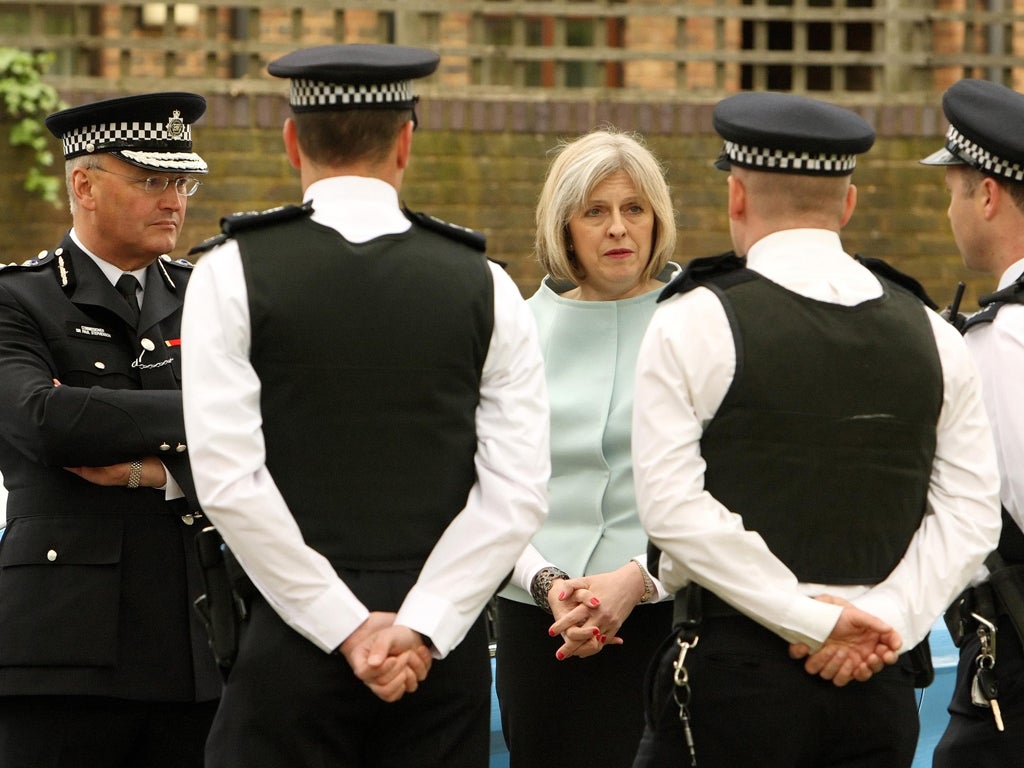Police 'stand-off' threatens to break Osborne's pay cap
Independent report will put ministers on the spot with recommendation of awards for officers

Your support helps us to tell the story
From reproductive rights to climate change to Big Tech, The Independent is on the ground when the story is developing. Whether it's investigating the financials of Elon Musk's pro-Trump PAC or producing our latest documentary, 'The A Word', which shines a light on the American women fighting for reproductive rights, we know how important it is to parse out the facts from the messaging.
At such a critical moment in US history, we need reporters on the ground. Your donation allows us to keep sending journalists to speak to both sides of the story.
The Independent is trusted by Americans across the entire political spectrum. And unlike many other quality news outlets, we choose not to lock Americans out of our reporting and analysis with paywalls. We believe quality journalism should be available to everyone, paid for by those who can afford it.
Your support makes all the difference.Downing Street fears a stand-off with police when a report on pay is handed to ministers early this week. There is mounting concern that the report will support awards that threaten to wreck George Osborne's tough stance on public sector wages.
The report, by the Police Arbitration Tribunal (PAT), follows the initial recommendations of the Winsor review into police pay and conditions. The first part of the review, released last year, called for a two-year pay freeze. But it also recommended important changes to allowances for unsocial working hours and expertise payments which could hole Treasury targets.
Theresa May, the Home Secretary, is not expected to respond to the report until later this month. But she is under pressure to abide by the decision of the final PAT report, which could recommend a pay rise for officers which is out of step with Osborne's curb on public sector pay rises for nurses, teachers and the armed forces.
When the then Home Secretary Jacqui Smith rejected a PAT recommendation of a 2.5 per cent pay rise in 2007, it prompted a demonstration by more than 25,000 officers through London – unprecedented in the post-war era – angrily denouncing her "betrayal". At the time, Ms May attacked Labour for failing to honour the PAT ruling and demanded a Commons debate "on the breakdown in the crucial relationship between the police and the Home Secretary".
Before the general election the Tories said they would honour the PAT findings and would only go against them with the support of parliament.
The Police Federation, which represents officers up to the rank of chief inspector, has already lobbied MPs to support the PAT finding. After Ms Smith's resignation, there were serious calls in police ranks to rescind the no-strike rule which binds police. They publicly supported last year's industrial action by other unions opposing moves to increase pension contributions.
Although anxious to reform police pay, many MPs warn this is not the year to provoke a confrontation with them after the summer riots and increased security demands in the run-up to the Olympics.
The Winsor report recommended that officers who work unsocial hours should receive an extra 10 per cent of their basic pay on an hourly rate (between 8pm and 6am). Tom Winsor, the former rail regulator, estimated his recommendations would save £485m over three years.
Steve McCabe, the Labour MP and member of the parliamentary Home Affairs Select Committee, said: "The issue has been whether or not they are going to honour the principle of independent assessment of police pay. The bottom line is they are not going to get away with imposing a new structure on the police at the moment. When you have got a freeze on recruitment, arrangements to retire people at 50 and imposing cuts on this scale, entering into an argument over wage bargaining will be the straw that breaks the camel's back."
"You need a degree of goodwill with the police at all times. No one is saying there cannot be some change, but I don't think you can add a one-sided imposition of change without there being problems.
"Personally, I think the Government have cut police ranks more heavily than the inspectorate report recommended and that's put them under incredible strain.
"Police morale is pretty low and I just think [change] is probably not a great idea when we have got the Olympics coming up."
Join our commenting forum
Join thought-provoking conversations, follow other Independent readers and see their replies
Comments